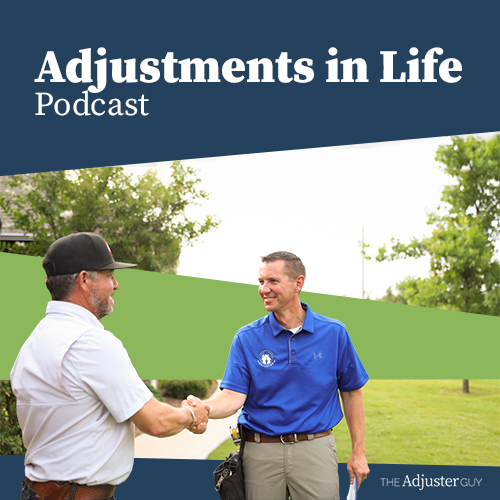Links
Derek Crumpton on LinkedIn: https://www.linkedin.com/in/derek-crumpton-203a9889
Alacrity Solutions website: https://www.alacritysolutions.com/
Transcript
Alan: Alright folks, welcome back to the show. I have a guest on today that I feel is a great insight to adjusters coming up and getting started in this field as well as adjusters who have been out for a while.
He’s a really good guy. I’ve learned to work with him and have worked with him on a number of occasions. He’s been super supportive anytime I needed him as a manager, and so I’m going to welcome on Mr. Derek Crumpton with Alacrity Solutions.
Derek: Hey, Alan, how are you today?
Alan: I’m doing pretty good Derek. How are you doing these days?
Derek: I’m good. I’m good.
Alan: They’ve got you running all over the country?
Derek: Not now actually. I’m home and glad to be home. Got home from that little vent in Mississippi—glad to have a little time in the house.
Alan: How much of the time do you think you spend out than at home?
Derek: You know, Alan ‘course like everything in this business a lot of it is dependent—2019 I was probably only gone, I don’t know, five or six weeks total. This year, I spent more time in Colorado this summer than I did at home. Then we had that event in Louisiana, then another one in Mississippi, so this year I have been gone probably close to three months off and on—never all in one stent.
Alan: Yeah, well the funny part about it is that I know a lot of adjusters didn’t spend that much time out. 2020 was a strange year! Usually the adjusters much more than the managers seem to get out.
But the rolls kinda reversed this year. A lot of the listeners who are tuning into this are relatively new—some of them may have been in for a while. But you know, everybody has a story of how they came about to get into what we do and the things that led them up to it and places that they’ve been.
Tell us a little bit about your background.
Derek: So my first job in the industry was in about 1998. And I was actually on staff with State Farm on the property claims side—we called it fire.
It was a small claims office in Wichita Falls, Texas; and that’s where I got my feet wet in this business. It was primarily what we refer to as daily claims or regular business—washing machine hose breaks and toilet supply line breaks or something overflows—did a whole lot of that.
Did that for a couple years and then got a pretty good offer from a contractor who did nothing but restoration work and that was about the time of the giant black mold scare that was going to kill us all here in Texas.
So it became unbelievably adept at writing Xactimate interior estimates and billed back estimates and did that for several years. And I had my own contracting business for a while.
Alan: And this is after your stent with State Farm?
Derek: This was after State Farm.Yeah and then slowly migrated over to the CAT side of things, and I started out with another firm—got to do a lot of things with them and had the opportunity to come over to Alacrity and here I am.
Alan: Yeah I’m so, you know, speaking in terms of staff and then going into more of the contracting side and then back into insurance adjusting on the independent side—what are the differences?
Some of these folks are going to be looking at the possibility of maybe getting into a staff position versus an independent position. What are those things—what can you show us that were different about the two different models?
Derek: So, of course, there’s there’s also some big time difference on my part—you know ‘98 to when I transitioned over to the IA side of things—was somewhere around 2009, I guess.
So to me, though, probably the greatest difference was probably on the staff side—you’re pretty well handed, “hey, you know, this is what you need to get done today” and they took the attitude of at least back—and, in fact, I had two different managers tell me this “Derek, a closed paid claim is a happy claim and we’re looking for happy claims.”
And there was less hurry, there was less urgency, and they were, at that time anyway, probably more customer-driven or insured driven. You know, they wanted to make sure everything was button up tight, and everybody was happy.
And not that they don’t want that on the independent side, but the big change in the industry has been particularly on the IA side. You know, when we need to try to get to as many people as we can get to as fast as we can get to them.
And you know I like to think that we still take care of the insureds. You know there’s still some compassion and some empathy when you go out there and to make sure that you’re doing everything you can for them; but it’s just geared a little differently.
You know there’s not somebody always looking at your cycle times on the staff side and things of that nature. So I would guess probably, you know, you treat them a little differently as a staff adjuster—speaking about the insureds—you do as an IA, only because you’re allowed to take a little more time to treat them a little differently.
Alan: Yeah, I am in agreement with that. I think that it’s kind of goes without saying that typically in a staff position, like you brought up, they they are granted a little more time in the fact that they—the carriers themselves—want more of that bond with the with the insured; Where the independent side tends to lean more towards production.
Not to say that that time with the insured isn’t valuable and that we don’t have an obligation to address that insured properly, but we drive more on the production side than just focusing on happy customers. It takes both both of those for our requirements to make the customer happy.
If you looked at it as a one way or another that you prefer which do you think you preferred? Would you choose the staff over—if you had it all to do over again, would you choose the staff over the independent position?
Derek: No. As much as I enjoyed that, and even on the contracting side—you know, on the contracting side you spend potentially months with an insured, you know, like on a large fire loss or something like that—and as much as I enjoy all that I think the somewhat autonomous, self-driven side of the IA side of things, I think, is very appealing to me.
I can go meet with an insured, spend 30 minutes with them or 2 1/2 hours with them; and I like to think I get across that I’m really just here to help, whether it’s whatever the time frame is. But, I think, the part on the IA side where you have to find your own drive and the autonomous nature of it I think appeals to me a little more.
Alan: Yeah, I am, I think I’m right there with you. Of course, I haven’t had the opportunity to work on the staff side—I have contemplated earlier in my career to attempt the staff side, just because there is a sense that a little bit more sense of security because you have a job that you work full-time at. Where, you know, IAs are a little more seasonal—we don’t have that option to get a steady paycheck unless we make that priority to stay out and work all the time.
Derek: And particularly in those earlier years. You know, when you’re first getting into it; and hey, if you’re being honest sometimes a deployment can be tough to come by when you’re trying to get your foot in the door.
Yeah, there’s a lot of upside to the staff job, no doubt. I think once you’re in it for a while, you know—and everybody’s different—but, yeah, I think that the independence of the independent adjuster is pretty appealing to me anyway.
Alan: Oh definitely! Definitely! That’s what inspired us in the beginning—obviously the money. The independent side is typically a higher higher income and a lot more freedom in what we do.
You know, so that’s always appealing; but there are cons to that as well like with what you brought up—sometimes a deployment is really tough to come by even when you really need it.
So when you—of all the places you’ve been and, of course, you’ve been in all different sides—what are some of the most memorable moments or things that you picked out as things that really stood out throughout your years of moving through the industry?
Derek: Probably really, Alan, it’s the people—both the insureds and the people that I’ve been fortunate enough to know and to work with, like yourself. That’s what’s been memorable to me.
And whether it’s insureds—and there’s a lot of them in some parts of the country—that when you show up, you can tell they meet you at the end of the driveway and they’re expecting this to be a fight. And before it’s over with, they’re shaking your hand and patting you on the back and thanking you for everything you did.
That means a lot to me and always did. And not everything is a victory, but when you can get that to happen I think those things really stand out.
There’s—gosh—there was one old retired steel worker in Pittsburgh that it still stands out in my mind. I’m not kidding you this guy met me at the street and you could tell he was ready.
Before it was all over with I really thought I was going to get a Christmas card from him and his sweet little wife. It was quite a deal.
But you get to meet some great people. Two summers ago, in Colorado, got to meet a World War II glider pilot. Yeah this ole guy was pretty cool. And got visit with him a little bit.
I noticed his license plate on his car and I was on a ride along and so I had an opportunity to visit with him a little bit. And I asked him I said “I see your license plate there you were World War II vet?” And he said, “Yeah.”
And it was WWIIGP. He said, “You know what that GP stands for?” I said, “No sir I don’t.” He said, “Guts plenty.” I said, “Oh yeah!” He said, “No not really—glider pilot but that’s what we like.” I said, “Yeah, well, y’all did have some guts.”
And you know he was just an interesting dude. But I think what made it what makes it memorable to me and it still does is people in general—on both sides of the equation.
Alan: Absolutely, I couldn’t agree more. I know you’re, right now, you’re managing and have been for a while on the USAA account; and I think especially on that account, we are privileged enough to come across some very unique people—especially the elderly, they have experienced a lot of things and can share a lot.
And, well, experiences that you know my generation may not ever experience. And so being able to have that discussion and taking a little bit of time with those folks can can make a big impact—it made a big impact on me especially just being able to spend that time with people.
Derek: Yeah exactly, they’re—you can leave a whole lot of times getting more than you gave. And now, it’s—you’re right—they’re neat folks, and they can put a lot of life into perspective for you if you visit with some of those some of those especially World War II vets—visit with them just a few minutes and your problems don’t seem nearly as big.
Alan: Oh absolutely! Is there any place—I know I have my favorites of where I like to work and I have places that I refuse to work. Is there any place in particular that was your favorite place to work or places that you refuse to work?
Derek: So, I really like going to this Colorado Springs area in Colorado. I just like it there. I really like the people. You know, and it’s nice to get up every morning, when your Texas boys like we are, and there’s the mountains out your hotel window—that’s not a bad start to the day at any time.
I really like going there. Oddly enough, I’m like going to South Florida too. When you go down there it’s usually a pretty big event, and maybe it’s because I like Cuban food and fresh fish—I don’t know—but I’ll like going down there.
But yeah, I really like those two places. And, man if I never have to go back to Philadelphia, I’m just fine with that.
Alan: Amen to that! Amen to that! I think I rate Philadelphia—and don’t get me wrong, there’s a lot of history in these places. And for the first time you go there it’s amazing. But I think I’ve been to Philadelphia and Chicago and probably Boston enough times that I’m satisfied for a few years.
Derek: Yeah! Yeah, I would like to go—I actually would go back to Philadelphia on a vacation type deal; but, yeah, if I never have to work there again I’m good with life just like that.
Alan: Now, I got to say that probably my favorite place I’ve ever worked—and again it’s not so much as my favorite places probably are not so much based on the work—it’s like you say—it’s waking up in the morning looking at the mountains. The air is cool and crisp. It’s, you know, it’s summertime and you wake up it’s 65° instead of—in Texas, you know, its 99 out still at 6 o’clock in the morning.
You know, the fresh air; but I think probably Rapid City, South Dakota is probably the top of the list for me. I really, really enjoy there—not to mention the claims are generally pretty good there because they’re a pretty hail prone state. That’s kind of the bread and butter, so it’s always a good place to go.
In what you’ve seen through your career and working with new adjusters, working seasoned adjusters—a new adjuster coming in or an adjuster that’s been around for a while—what are the key things you look for in these guys on the management side that makes you go “this is a good guy to have on board, I want to keep this guy around?
Derek: So, on our side of things, it’s kind of multifaceted. One, of course, it’s moving with some sense of urgency. And I think one of the things that’s one of the things that I had to adapt to when I first came over to this side was fully grasping the urgency that’s needed—whether that’s making contacts, getting inspected and closed, moving with purpose on an inspection.
So, yeah, a sense of urgency in that you’re, you know, it’s apparent that you are—particularly for new people—that you’re doing everything you can to keep things moving in the right direction. And then the other side, of course, that we always have to deal with is the quality of the files you’re sending up. Getting the needed information—whether it’s photos, notes, whatever the case is—into the file in a way that allows it to get on through review and get onto the carrier so that it can be settled.
All of that I think probably has to be learned, and I never mind helping someone do that. So, while it’s those two things, it’s also an adjuster‘s response to when you have to go to them and say “look you’re behind or your fall qualities down or whatever the case is.” What their response to that is you know—nobody’s looking for a lot of excuses.
You come back—if your come back is “yeah I get it. I understand what you’re talking about. I’ll fix it from here on out.” Or when there’s good questions. So, you know, “Okay tell me what you’re looking for in these photos.”
Man, I don’t mind providing that information. I never mind doing that, because I the way I look at this, we’re all pulling on the same rope. So if I’m passing along that information to you that’s going to help you, that in turn also helps me. It’s a response to the constant demands of what we do when we’re deployed, when we’re working clients at home, whatever the case is—the constant demand to always try to be a little better and the response to that from an adjuster.
Alan: Absolutely my theory always was urgency and attitude. So you’re kind of right there with it. You know, I mean, we have a job to do and we have a guideline on when we do that and how we do it. So understanding that these guidelines mean something—they were put in place for a reason.
And then when somebody says something to you about it, have the attitude of “Okay this is what I do, my job is to make sure I’m fitting the mold, I’m doing it in ample time, and I’m doing it to the best of my ability.” And that’s it!
The requirements aren’t a whole lot, so great advice. I agree with you 100 percent.
Derek: It can be tough especially when you’re new or when you get used to a client and you have to go to work with a new client. I mean, hey, we saw some challenges this summer with a client that you and I were both involved in to a degree.
And, you know, as experienced it is good as an adjuster as you are, there were challenges there to meet. And like you said, you’re right—urgency of attitude, that goes along way.
Alan: Yeah, and you know what, we all—even as seasoned adjusters—we find ourselves in situations that we’re not pleased with. We have to find some workarounds to get things done; but at the same token you know it rolls back to that attitude.
I can get upset and say “no” but the job still got to be done, and we still got to get these things taken care of. We still got to take care of those customers regardless of whether it’s in our favor or not.
So you know that attitude just means everything—everything—when it comes to handling these claims.
If there was a—throughout your career or maybe in the beginning of your career it might’ve been—I had a piece of advice given to me when I first started and it stuck with me and it helped build me to be the adjuster that I am.
Was there ever a piece of advice given to you that you feel like, you know, you think about that you might of carried with you all these years that helped mold you into where are you come—what you become in this industry?
Derek: Aw man, probably something along the lines of “go slow but hurry up.” And really that applies to everything we do—whether it’s you know that initial contact for the inspection or the writing of the claim—go slow and get it right but hurry up man and get it done.
I think maybe that’s it. You know, at first that sounds like it’s nonsense you can’t go slow and hurry up. But I think, especially early on, you have to do that. You got to set yourself up for success. I know for me, with a new adjuster, I try to set them up for success; but you have to do it some yourself too.
You know it’s just like somebody telling you, “Look, when you hit this storm, I don’t want to see you with five appointments on day one.” And then they get there, and they’ve got five appointments on day one and you know where this is going.
So, go slow but hurry up and take in what people are telling you—especially early on. Promise nobody—it doesn’t behoove anyone to give you bad advice, you know, particularly from the managerial side, so try to take already and ask questions.
Alan: That’s good. So we’re nearly out of time, but I do have one question that I was asked to see if you’d release and that was the secret behind your brisket. How do you cook your brisket good enough to taste the way it does?
Derek: Alright, you ready. It’s a big secret. Everybody get your pen out. ‘Cause I’m about to give it all away—kosher salt, corse ground pepper, and cook it ‘till it’s done. That’s it man. That’s all there is to it!
Alan: That’s it?
Derek: That’s it, I promise.
Alan: Well, I can tell those of you that are listening this man right here cooked us a brisket in Beaumont, Texas this year that was probably the best brisket I think I’ve ever put in my mouth—even though it was cooked on an easy-bake oven in your words.
Derek: It was.
Alan: We didn’t have a real pit to cook on, but thanks to Chad we may do—
Derek: Chad saved us from another McDonald’s hamburger, man.
Alan: Oh man! Well things are changing in the industry and it seems like the days of of the help rooms—even though we do have help set up—the big orientations and lots of people getting together is dwindling away; but it was really it was really nice to be able to hang out around the help room, converse with everybody. And you know I feel like—I wish they would go back to the days of the conventions.
You know, where the end of the year—in January or December, whichever they chose—where everybody could still get together and, you know, do the CE hours—whatever they decided to offer that year.
I know the industry’s changed and, with all the online stuff, it’s not as feasible as what it used to be. But I don’t know about you, I sure did enjoy that time together to hang out and mingle together.
Derek: Oh yeah, for sure. Yeah, face-to-face connection is it can mean a lot and I know it means a lot to me, I know it means a lot to a lot of adjusters. And, yeah, I miss that too. I wish there was more of that still around. Sure.
Alan: Yeah I know it’s, in a lot of cases now—especially during the spring and summer season—they don’t do that as much for the orientations, but I try to tell the new adjusters that are getting deployed—if you see an opportunity to meet with the manager or go to a help room, you need to do that.
You need to see them face-to-face, you need to shake their hands, you need to put it getting out a face to a name. And I still strongly believe that that can grow a relationship and help impact a relationship tenfold—just by taking one opportunity to get to go meet face-to-face.
Derek: I could not agree more. And if you’re in a situation where you just have a manager on-site and you’re new, reach out to them early and ask for a ride along. Ask for that up front. It’s only going to help you both in the actual claims work and then as that event moves on, you know, your manager has a good idea of who she’s dealing with.
So yeah if they’re on site make that phone call early, put your hand up, ask for that help, ask for that ride along. It goes along way.
Alan: Absolutely! Well, hey Derek, I really appreciate you joining in today. It’s been a great conversation. I’d love to get you back on here again after a few months maybe—whenever we have time or get together somewhere—maybe we can meet on site—and have a little roundtable discussion on site. Would you be willing to do that?
Derek: Oh, you bet! Yeah!
Alan: Alrighty folks, Derek Crumpton. That’s it for this week, and I hope everybody enjoyed it. It was a good conversation and everybody be safe out there and will see you next time.





